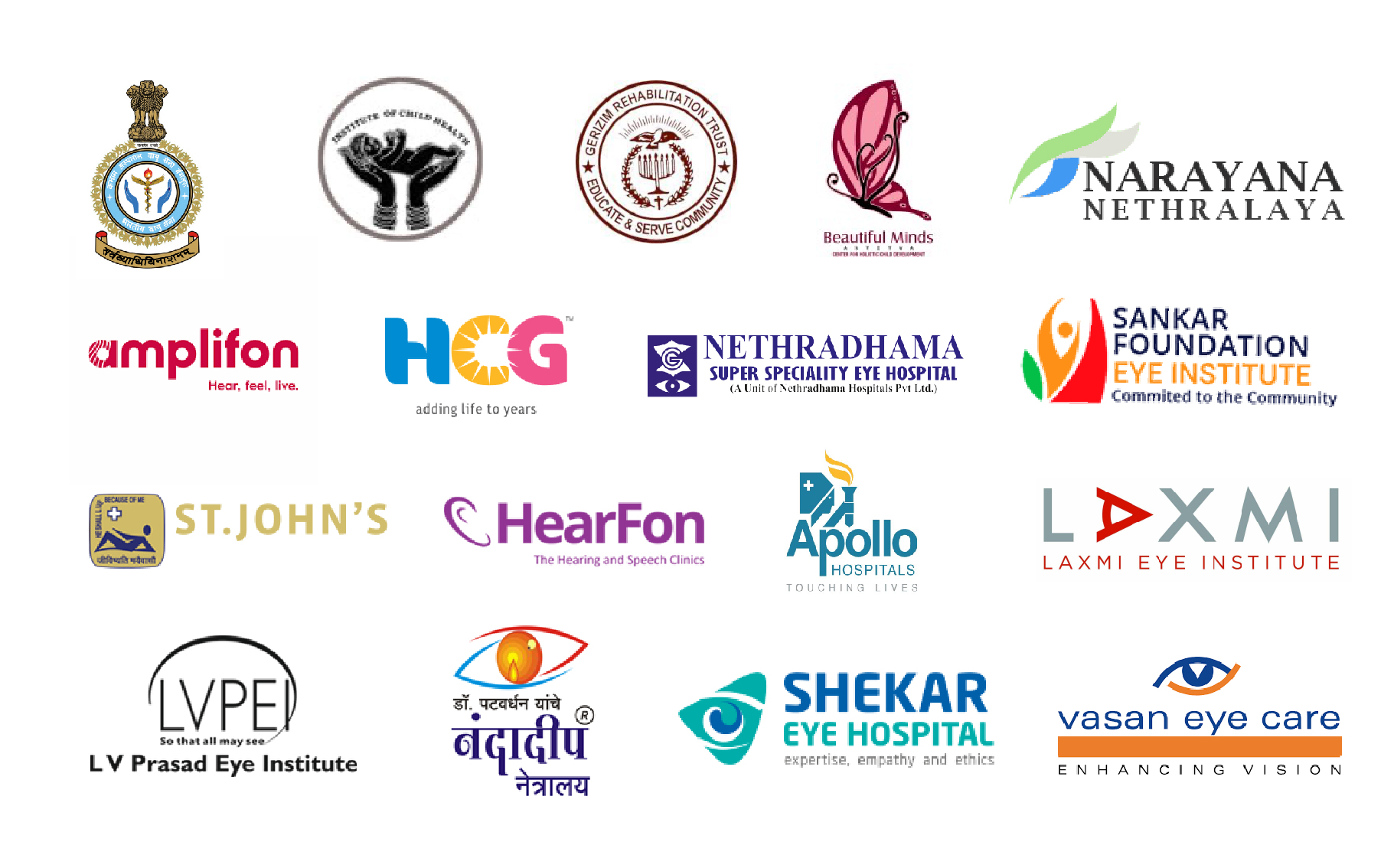
BSc. OPTOMETRY & MSc. OPTOMETRY
BSc. OPTOMETRY
B.Sc. OPTOMETRY degree course is a four year degree program which is affiliated to Rajiv Gandhi University of Health Sciences (RGUHS) , includes one year internship where much emphasis will be given in hands on training. This program is designed to train students to become competent in the techniques of optometry, to work in evaluating and managing ophthalmic disorders.
An optometrist is a primary health care professional who is institutionally educated and clinically trained in the art and science of optometry. He is required to examine the eyes and the visual system, diagnose the visual problem, prescribe and provide remedial, corrective treatment.
If any pathological condition is detected during the examination, the optometrist immediately refers the patient to an Ophthalmologist (ophthalmic surgeon) for medical therapy and/or surgical correction.
Optometric practice does not only include the determination of the refractive status of the eyes, pre-scribing and dispensing of glasses, it has a wider scope than that. With the advance of technology, and newer products being introduced in quick succession, an optometrist is also required to upgrade his knowledge continuously. For an optometrist to be a thorough professional, his optometric education through the proper channels is very important.
ELIGIBILITY
- Candidates for this 4-year program leading to the B.Sc optometry degree should have passed the 2-year pre university examination (10+2) with English as one of the subject along with Physics, Chemistry, Biology / Math’s as subject.
- They should have passed any other examination recognized as equivalent to 2-year Pre University (with science). The same applies to foreign students.
- Applicants are selected on merit in their performance entrance test interview held by the college.
- Students undergo a period of certified study over 3 academic years from the date of commencement of classes for subjects according to the prescribed curriculum till completion of the examination following by 1 year compulsory internship
- English shall be the medium of instruction for all subjects of study and for exam.
SYLLABUS
- General & Ocular Physiology
- Anatomy and Biochemistry
- Nutrition
- Physical & Geometrics Optics Principle of Light
- Computer Programming
- English
- Kannada
- Mathematics
- Accountancy
- Optometric & Visual Optics
- Optometric Instruments
- Clinical Examination of Visual System & Ocular Disease
- Microbiology
- Pathology & Pharmacology
- Clinics
- Hospital Procedure
- Medical Psychology
- Communication & PR
MSc. OPTOMETRY
MSc. Optometry is a 2-years full-time postgraduate degree course which is affiliated to Rajiv Gandhi University of Health Sciences (RGUHS) , that imparts advanced study on diagnosis and treatment of the common eye-related diseases and refractive disorders. It includes the study of subjects like general physiology and ocular physiology, hospital procedures, low vision aids, geometrical optics, nutrition etc.
Masters in optometry involve examining, diagnosing, treating, and managing visual diseases and disorders. This program is about the science of optical equipment (including lenses and spectacles) that improve human vision. Candidates should possess the ability to understand and apply scientific principles and methods with a high degree of accuracy.
ELIGIBILITY
- Candidates who are willing to pursue this course must hold a Bachelor’s degree in Optometry or MBBS degree from a Medical Council of India recognized institute with an aggregate of at least 50% marks.
- Admission to this course is offered on the basis of marks obtained by the candidates in their Bachelor’s degree course and personal interview session conducted by the college authority.
- Admissions to MSc. Optometry will be done on the basis of the merit list and counseling interview conducted by the college committee of the University.
- English shall be the medium of instruction for all subjects of study and for exam.
Mode of practice in Optometry
1. Individual Private Practice
The individual private practitioner usually is a primary care optometrist with a standalone practice. Such practitioners may specialize in fields such as:
• Contact lenses
• Pediatrics
• Low vision/geriatrics
• Vision therapy
An individual practice may be in a variety of settings and locations, ranging from a freestanding to a professional building.
2. Group Practice
This mode of practice is very similar to an individual practice except that there are two or more optometrists in the group. Each member of the group may specialize in a different area of practice. This is an increasingly popular form of practice.
3. Optical Settings
In this setting, optometrists usually rent space from or are employed by a large retail outlet. However, they remain independent practitioners.
4. Academic/Research
The Optometrist either teaches about primary care or performs research in a university setting. Academics pursue additional training after optometry school and have completed a masters, or doctoral program.
5. Consultants
Optometrists work as consultants to the ophthalmic industry, education, sports.
Duties
- Perform vision tests and analyze results
- Diagnose sight problems, such as nearsightedness or farsightedness and eye diseases, such as glaucoma under supervision of ophthalmologist
- Prescribe eyeglasses, contact lenses.
- Provide treatments such as vision therapy or low-vision rehabilitation
- Provide pre- and postoperative care to patients undergoing eye surgery—for example, examining a patient’s eyes the day after surgery
- Evaluate patients for the presence of diseases such as diabetes and refer patients to other healthcare providers as needed
- Promote eye health by counseling patients, including explaining how to clean and wear contact lenses
Scientific research is systematic controlled, empirical & critical investigation of hypothetical propositions about the presumed relations among the natural phenomenon.
Optometric Research
Ophthalmic optics is a science which deals with the structure, function and working of the human eye. Popularly known as optometry. Research in optometric is a vital activity which seeks to fill gaps in knowledge in the broad area of optometry and vision science. Some research directly influences the care of optometric patients on an everyday basis. Some generates information on how the eye and visual system work.
Research in NAISH
Research in NAISH includes investigations in areas such as binocular disorders, low vision, ocular disease and the effects of contact lens wear. Basic research focuses on such disciplines as bioengineering, neurophysiology, visual neuroscience, molecular and cell biology, cell membrane biochemistry, biostatistics, robotics, contact lenses, ocular infections, refractive development, corneal suface, infant vision and computational vision.
Scope of Optometrists
The scope of optometric practice in India and abroad is great and unlimited. It is a dynamic and challenging career which could achieve personal growth, community respect and offer job flexibility, financial success and unlimited opportunities.
The syllabus for the Bachelor of Clinical Optometry (B.Optom) course aims at preparing a primary health care professional, as an “Optometrist” who can independently undertake.
- Estimate refractive errors of the eye and prescribe corrective measures including Spectacles, Contact Lenses, Low Vision Aids and Vision Therapy
- Detect pathological conditions of the Visual system, which are deviations from normal. Diagnose ocular and related systemic and neurological diseases and refer the cases to other medical professionals for detailed medical and surgical management.
- Design, manufacture, prescribe and fit all kinds of Optical aids including Spectacles, Sunglasses, Ophthalmic lenses, Contact Lenses, Low Vision aids
- Examine, diagnose and prescribe treatment for Oculo-motility malfunctions like phorias, tropias and other types of strabismus (squint) and Neuro-muscular anomalies
- Undertake Public Health Optometry projects and vision screening eye camps in schools, colleges, urban slums, rural areas and also practice occupational Optometry in industries
- Public education on ocular hygiene and related nutritional and environmental counseling. Offer a helping hand and or efficiently manage and successfully run any ophthalmic clinic, Eye department in hospitals, Optician shops, Optical, Ophthalmic industry & trade
Optometrists are the major providers of primary vision care as independent, primary health care providers who examine, diagnose, treat, and manage diseases and disorders of the visual system, the eye and associated structures as well as diagnose related systemic conditions.
Optometrists also do testing to determine the patient’s ability to focus and coordinate the eye, judge depth perception, and see colors accurately. The scope of optometry requires knowledge of the therapeutic and rehabilitative methods used to care for the problems of vision from infancy through old age.
The practice of optometry offers independence, flexibility, and diversity, and optometrists may choose to practice in inner cities, suburbs or rural areas. Opportunities exist in solo or group practices, multidisciplinary practice, health maintenance organizations, clinical or hospital settings. Teaching and research offer added opportunities.
A career in optometry offer great flexibility in work environment for solo practice to institution work; it offers a range of work patterns from clinical practice to research and teaching of work patterns from clinical practice to research and teacher and teaching. Optometrists enjoy the benefits of financial security, independence and recognition in their communities. World over, Optometrists are among the top ten income earning professionals. They also derive immense satisfaction of having benefited the population correction.
India, with its huge burden of eye diseases and a major program to eradicate avoidable blindness continues to face an extreme shortage of qualified optometry. The recent emergence of all- India optical chains by major players like TITAN, RELIANCE, L & M, etc. have greatly accentuated this shortage. Thus, excellent jobs are plenty today and will continue, in the foreseeable future. Our campus placement system will continue, in the foreseeable future. Our campus placement system will ensure that graduates from our college get great starts to their careers.
Career option available for the Optometry Include:
- Solo private practitioner
- Retail/optical settings
- Optometric/ ophthalmologic professional
- Public health
- Academic/ research
- Corporate/ industrial
- Consultants


